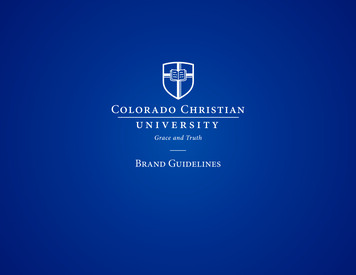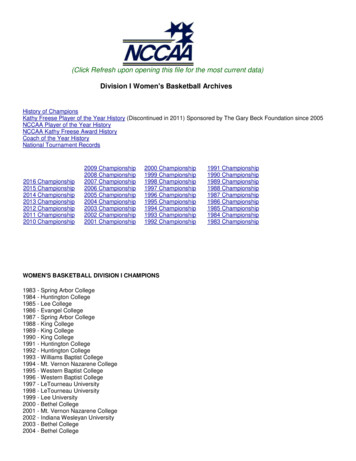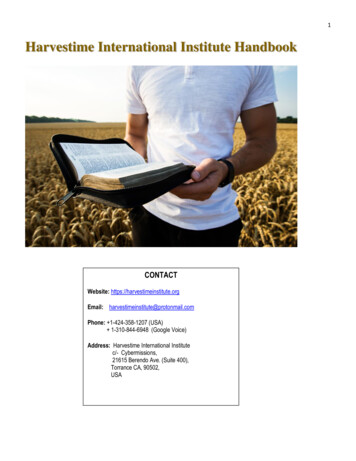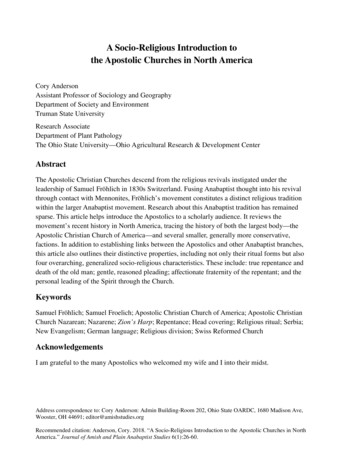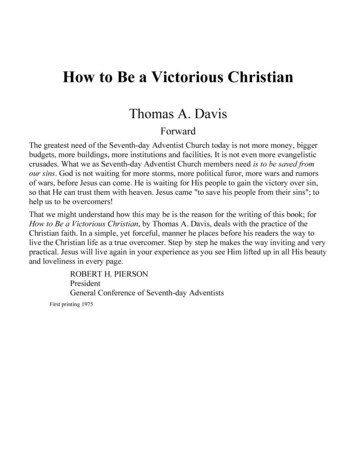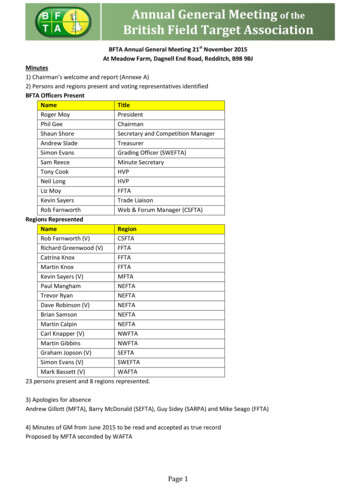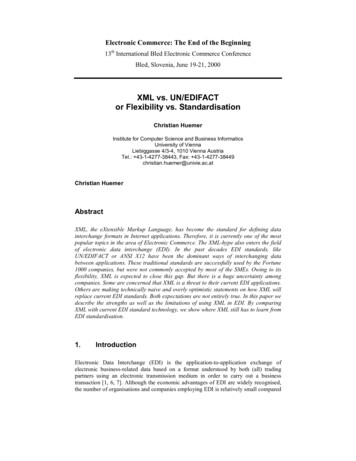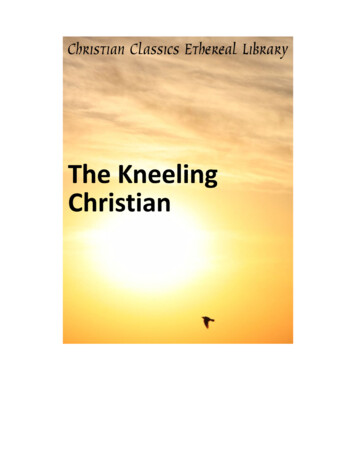
Transcription
The Kneeling ChristianAuthor(s):Unknown ChristianPublisher:Grand Rapids, MI: Christian Classics Ethereal LibraryDescription:Subjects:One of the most influential and widely circulated books onprayer, Kneeling Christian is a powerful and impassionedcall to prayer. This unsigned work shows the true working ofGod through the message of the unnamed author, whichchallenges the believer to a dedicated life of prayer.Throughout, the author treats these important and difficultissues with clarity and an attentive eye towards the Biblicalaccount of prayer. The author discusses vital issues ofprayer in order to provide an all-encompassing guide to alife of prayer. After all, the author encourages, believers cando far more in a life of prayer than in a life devoted to goodworks. With such encouragement and guidance, KneelingChristian has changed the way hundreds of thousands ofbelievers have prayed.Tim PerrineCCEL Staff WriterPractical theologyWorship (Public and Private) Including the church year,Christian symbols, liturgy, prayer, hymnologyPrayeri
ContentsTitle Page1Author’ Preface2Contents3Chapter 1: God’s Great Need4Chapter 2: Almost Incredible Promises9Chapter 3: “Ask of Me and I Will Give”15Chapter 4: Asking for Signs22Chapter 5: What Is Prayer?30Chapter 6: How Shall I Pray?38Chapter 7: Must I Agonize?46Chapter 8: Does God Always Answer Prayer?56Chapter 9: Answers to Prayer62Chapter 10: How God Answers Prayer66Chapter 11: Hindrances to Prayer71Chapter 12: Who May Pray?78Indexes83Index of Scripture References84ii
This PDF file is from the Christian Classics Ethereal Library, www.ccel.org. The mission ofthe CCEL is to make classic Christian books available to the world. This book is available in PDF, HTML, ePub, Kindle, and other formats. Seehttp://www.ccel.org/ccel/unknown/kneeling.html. Discuss this book online at http://www.ccel.org/node/2914.The CCEL makes CDs of classic Christian literature available around the world through theWeb and through CDs. We have distributed thousands of such CDs free in developingcountries. If you are in a developing country and would like to receive a free CD, pleasesend a request by email to cd-request@ccel.org.The Christian Classics Ethereal Library is a self supporting non-profit organization atCalvin College. If you wish to give of your time or money to support the CCEL, please visithttp://www.ccel.org/give.This PDF file is copyrighted by the Christian Classics Ethereal Library. It may be freelycopied for non-commercial purposes as long as it is not modified. All other rights are reserved. Written permission is required for commercial use.iii
Title PageTHE KNEELING CHRISTIANBy AN UNKNOWN CHRISTIAN1
Author’ PrefaceAUTHOR’S PREFACEA traveller in China visited a heathen temple on a great feast-day. Many were the worshippers of the hideous idol enclosed in a sacred shrine. The visitor noticed that most of thedevotees brought with them small pieces of paper on which prayers had been written orprinted. These they would wrap up in little balls of stiff mud and fling at the idol. He enquiredthe reason for this strange proceeding, and was told that if the mud ball stuck fast to theidol, then the prayer would assuredly be answered; but if the mud fell off, the prayer wasrejected by the god.We may smile at this peculiar way of testing the acceptability of a prayer. But is it nota fact that the majority of Christian men and women who pray to a Living God know verylittle about real prevailing prayer? Yet prayer is the key which unlocks the door of God’streasure-house.It is not too much to say that all real growth in the spiritual life— all victory overtemptation, all confidence and peace in the presence of difficulties and dangers, all reposeof spirit in times of great disappointment or loss, all habitual communion with God— dependupon the practice of secret prayer.This book was written by request, and with much hesitancy. It goes forth with muchprayer. May He Who said, “Men ought always to pray, and not to faint,” “teach us to pray.”2
ContentsCONTENTS1. GOD’S GREAT NEED2. ALMOST INCREDIBLE PROMISES3. “ASK OF ME AND I WILL GIVE”4. ASKING FOR SIGNS5. WHAT IS PRAYER?6. HOW SHALL I PRAY?7. MUST I AGONIZE?8. DOES GOD ALWAYS ANSWER PRAYER?9. ANSWERS TO PRAYER10. HOW GOD ANSWERS PRAYER11. HINDRANCES TO PRAYER12. WHO MAY PRAY?3
Chapter 1: God’s Great NeedCHAPTER 1: GOD’S GREAT NEED“GOD Wondered.” This is a very striking thought! The very boldness of the idea oughtsurely to arrest the attention of every earnest Christian man, woman and child. A wonderingGod! Why, how staggered we might well be if we knew the cause of God’s “wonder”! Yetwe find it to be, apparently, a very little thing. But if we are willing to consider the mattercarefully, we shall discover it to be one of the greatest possible importance to every believeron the Lord Jesus Christ. Nothing else is so momentous—so vital—to our spiritual welfare.God “wondered that there was no intercessor” (Isa. lix. 16)—“none to interpose” (R.V.,marg.). But this was in the days of long ago, before the coming of the Lord Jesus Christ “fullof grace and truth”—before the outpouring of the Holy Spirit, full of grace and power,“helping our infirmity,” “Himself making intercession for us” and in us (Rom. viii. 26). Yes,and before the truly amazing promises of our Savior regarding prayer; before men knewvery much about prayer; in the days when sacrifices for their sins loomed larger in theireyes than supplication for other sinners.Oh, how great must be God’s wonder today! For how few there are among us who knowwhat prevailing prayer really is! Every one of us would confess that we believe in prayer, yethow many of us truly believe in the power of, prayer? Now, before we go a step farther, maythe writer most earnestly implore you not to read hurriedly what is contained in thesechapters. Much—very much—depends upon the way in which every reader receives whatis here recorded. For everything depends upon prayer.Why are many Christians so often defeated? Because they pray so little. Why are manychurch-workers so often discouraged and disheartened? Because they pray so little.Why do most men see so few brought “out of darkness to light” by their ministry? Because they pray so little.Why are not our churches simply on fire for God? Because there is so little real prayer.The Lord Jesus is as powerful today as ever before. The Lord Jesus is as anxious for mento be saved as ever before. His arm is not shortened that it cannot save: but He cannot stretchforth His arm unless we pray more—and more really.We may be assured of this—the secret of all failure is our failure in secret prayer.If God “wondered” in the days of Isaiah, we need not be surprised to find that in thedays of His flesh our Lord “marvelled.” He marvelled at the unbelief of some—unbeliefwhich actually prevented Him from doing any mighty work in their cities (Mark vi. 6).But we must remember that those who were guilty of this unbelief saw no beauty inHim that they should desire Him, or believe on Him. What then must His “marvel” be today,when He sees amongst us who do truly love and adore Him, so few who really “stir themselvesup to take hold of God” (Isa. lxiv. 7). Surely there is nothing so absolutely astonishing as apractically prayerless Christian? These are eventful and ominous days. In fact, there are4
Chapter 1: God’s Great Needmany evidences that these are “the last days” in which God promised to pour out His Spirit—the Spirit of supplication—upon all flesh (Joel ii. 28). Yet the vast majority of professingChristians scarcely know what “supplication” means; and very many of our churches notonly have no prayer-meeting, but sometimes unblushingly condemn such meetings, andeven ridicule them.The Church of England, recognizing the importance of worship and prayer, expects herclergy to read prayers in Church every morning and evening.But when this is done, is it not often in an empty church? And are not the prayers frequently raced through at a pace which precludes real worship? “Common prayer,” too, oftenmust necessarily be rather vague and indefinite.And what of those churches where the old-fashioned weekly prayer-meeting is retained?Would not “weakly” be the more appropriate word? C. H. Spurgeon had the joy of beingable to say that he conducted a prayer-meeting every Monday night “which scarcely evernumbers less than from a thousand to twelve hundred attendants.”My brothers, have we ceased to believe in prayer? If you still hold your weekly gatheringfor prayer, is it not a fact that the very great majority of your church members never comenear it? Yes, and never even think of coming near it. Why is this? Whose fault is it?“Only a prayer-meeting”—how often we have heard the utterance! How many of thosereading these words really enjoy a prayer-meeting? Is it a joy or just a duty? Please forgiveme for asking so many questions and for pointing out what appears to be a perilous weaknessand a lamentable shortcoming in our churches. We are not out to criticize—far less tocondemn. Anybody can do that. Our yearning desire is to stir up Christians “to take holdof” God, as never before. We wish to encourage, to enhearten, to uplift.We are never so high as when we are on our knees.Criticize? Who dare criticize another? When we look back upon the past and rememberhow much prayerlessness there has been in one’s own life, words of criticism of otherswither away on the lips.But we believe the time has come when a clarion call to the individual and to the Churchis needed—a call to prayer.Now, dare we face this question of prayer? It seems a foolish query, for is not prayer apart and parcel of all religions? Yet we venture to ask our readers to look at this matter fairlyand squarely. Do I really believe that prayer is a power? Is prayer the greatest power onearth, or is it not? Does prayer indeed “move the Hand that moves the world”?Do God’s prayer-commands really concern Me? Do the promises of God concerningprayer still hold good? We have all been muttering “Yes—Yes—Yes” as we read thesequestions. We dare not say “No” to any one of them. And yet—!5
Chapter 1: God’s Great NeedHas it ever occurred to you that our Lord never gave an unnecessary or an optionalcommand? Do we really believe that our Lord never made a promise which He could not,or would not, fulfil? Our Savior’s three great commands for definite action were:—Pray yeDo thisGo ye!Are we obeying Him? How often His command, “Do this,” is reiterated by our preacherstoday! One might almost think it was His only command! How seldom we are reminded ofHis bidding to “Pray” and to “Go.” Yet, without obedience to the “Pray ye,” it is of little orno use at all either to “Do this” or to “Go.”In fact, it can easily be shown that all want of success, and all failure in the spiritual lifeand in Christian work, is due to defective or insufficient prayer. Unless we pray aright wecannot live aright or serve aright. This may appear, at first sight, to be gross exaggeration,but the more we think it over in the light Scripture throws upon it, the more convinced shallwe be of the truth of this statement.Now, as we begin once more to see what the Bible has to say about this mysterious andwonderful subject, shall we endeavor to read some of our Lord’s promises, as though wehad never heard them before. What will the effect be?Some twenty years ago the writer was studying in a Theological College. One morning,early, a fellow-student—who is today one of England’s foremost missionaries—burst intothe room holding an open Bible in his hands. Although he was preparing for Holy Orders,he was at that time only a young convert to Christ.He had gone up to the University “caring for none of these things.” Popular, clever,athletic—he had already won a place amongst the smart set of his college, when Christclaimed him. He accepted the Lord Jesus as a personal Savior, and became a very keen follower of his Master. The Bible was, comparatively, a new book to him, and as a result hewas constantly making “discoveries.” On that memorable day on which he invaded myquietude he cried excitedly—his face all aglow with mingled joy and surprise—“Do youbelieve this? Is it really true?” “Believe what?” I asked, glancing at the open Bible with someastonishment. “Why, this—” and he read in eager tones St. Matthew xxi. 21, 22: “‘If ye havefaith and doubt not . . . all things whatsoever ye shall ask in prayer, believing, ye shall receive.’Do you believe it? Is it true?” “Yes,” I replied, with much surprise at his excitement, “ofcourse it’s true—of course I believe it.”Yet, through my mind there flashed all manner of thoughts! “Well, that’s a very wonderful promise,” said he. “It seems to me to be absolutely limitless! Why don’t we pray more?”And he went away, leaving me thinking hard. I had never looked at those verses quite inthat way. As the door closed upon that eager young follower of the Master, I had a vision6
Chapter 1: God’s Great Needof my Savior and His love and His power such as I never had before. I had a vision of a lifeof prayer—yes, and “limitless” power, which I saw depended upon two things only—faithand prayer. For the moment I was thrilled. I fell on my knees, and as I bowed before myLord what thoughts surged through my mind—what hopes and aspirations flooded mysoul! God was speaking to me in an extraordinary way. This was a great call to prayer.But—to my shame be it said—I heeded not that call.Where did I fail? True, I prayed a little more than before, but nothing much seemed tohappen. Why? Was it because I did not see what a high standard the Savior requires in theinner life of those who would pray successfully?Was it because I had failed to measure up my life to the “perfect love” standard sobeautifully described in the thirteenth chapter of the first Epistle to the Corinthians?For, after all, prayer is not just putting into action good resolutions “to pray.” LikeDavid, we need to cry, “Create in me a clean heart, O God” (Psa. li. 10) before we can prayaright. And the inspired words of the Apostle of Love need to be heeded today as much asever before: “Beloved, if our heart condemn us not, we have boldness toward God; and[then] whatsoever we ask, we receive of Him” (I John iii. 21).“True—and I believe it.” Yes, indeed, it is a limitless promise, and yet how little werealize it, how little we claim from Christ. And our Lord “marvels” at our unbelief. But ifwe could only read the Gospels for the first time, what an amazing book it would seem!Should not we “marvel” and “wonder”? And today I pass on that great call to you. Will yougive heed to it? Will you profit by it? Or shall it fall on deaf ears and leave you prayerless?Fellow-Christians, let us awake! The devil is blinding our eyes. He is endeavoring toprevent us from facing this question of prayer. These pages are written by special request.But it is many months since that request came.Every attempt to begin to write has been frustrated, and even now one is conscious ofa strange reluctance to do so. There seems to be some mysterious power restraining thehand. Do we realize that there is nothing the devil dreads so much as prayer? His greatconcern is to keep us from praying. He loves to see us “up to our eyes” in work—providedwe do not pray. He does not fear because we are eager and earnest Bible students—providedwe are little in prayer. Someone has wisely said, “Satan laughs at our toiling, mocks at ourwisdom, but trembles when we pray.” All this is so familiar to us—but do we really pray? Ifnot, then failure must dog our footsteps, whatever signs of apparent success there may be.Let us never forget that the greatest thing we can do for God or for man is to pray. Forwe can accomplish far more by our prayers than by our work. Prayer is omnipotent; it cando anything that God can do! When we pray God works. All fruitfulness in service is theoutcome of prayer—of the worker’s prayers, or of those who are holding up holy hands onhis behalf. We all know how to pray, but perhaps many of us need to cry as the disciples didof old, “Lord, teach us to pray.”7
Chapter 1: God’s Great NeedO Lord, by Whom ye come to God,The Life, the Truth, the Way,The path of prayer Thyself hast trod;Lord, teach us now to pray.8
Chapter 2: Almost Incredible PromisesCHAPTER 2: ALMOST INCREDIBLE PROMISES“WHEN we stand with Christ in glory, looking o’er life’s finished story,” the mostamazing feature of that life as it is looked back upon will be its prayerlessness.We shall be almost beside ourselves with astonishment that we spent so little time inreal intercession. It will be our turn to “wonder.”In our Lord’s last discourse to His loved ones, just before the most wonderful of allprayers, the Master again and again held out His kingly golden sceptre and said, as it were,“What is your request? It shall be granted unto you, even unto the whole of My kingdom!”Do we believe this? We must do so if we believe our Bibles. Shall we just read over veryquietly and thoughtfully one of our Lord’s promises, reiterated so many times? If we hadnever read them before, we should open our eyes in bewilderment, for these promises arealmost incredible. From the lips of any mere man they would be quite unbelievable. But itis the Lord of heaven and earth Who speaks; and He is speaking at the most solemn momentof His life. It is the eve of His death and passion. It is a farewell message. Now listen!“Verily, verily I say unto you, he that believeth on Me, the works that I do shall he doalso; and greater works than these shall he do: because I go unto the Father. And whatsoeverye shall ask in My name, that will I do, that the Father may be glorified in the Son. If ye shallask anything in My name, that will I do” (John xiv. 13, 14). Now, could any words beplainer or clearer than these? Could any promise be greater or grander? Has anyone else,anywhere, at any time, ever offered so much?How staggered those disciples must have been! Surely they could scarcely believe theirown ears. But that promise is made also to you and to me.And, lest there should be any mistake on their part, or on ours, our Lord repeats Himselfa few moments afterwards. Yes, and the Holy Spirit bids St. John record those words again.“If ye abide in Me, and My words abide in you, ask whatsoever ye will, and it shall be doneunto you. Herein is My Father glorified, that ye bare much fruit; and so shall ye be My disciples” (John xv. 7, 8).These words are of such grave importance, and so momentous, that the Savior of theworld is not content even with a threefold utterance of them. He urges His disciples to obeyHis command “to ask.” In fact, He tells them that one sign of their being His “friends” willbe the obedience to His commands in all things (verse 14). Then He once more repeats Hiswishes: “Ye did not choose Me, but I chose you, and appointed you, that ye should go andbear fruit, and that your fruit should abide: that whatsoever ye shall ask the Father, in Myname, He may give it you” (John xv. 16).One would think that our Lord had now made it plain enough that He wanted them topray; that He needed their prayers, and that without prayer they could accomplish nothing.9
Chapter 2: Almost Incredible PromisesBut to our intense surprise He returns again to the same subject, saying very much the samewords.“In that day ye shall ask Me nothing”—i.e., “ask Me no question” (R.V., marg.)—“Verily,verily I say unto you, if ye ask anything of the Father, He will give it you in My name. Hithertohave ye asked nothing in My name: ask, and ye shall receive, that your joy may be fulfilled”(John xvi. 23, 24).Never before had our Lord laid such stress on any promise or command—never! Thistruly marvelous promise is given us six times over. Six times, almost in the same breath, ourSavior commands us to ask whatsoever we will. This is the greatest—the most wonderful—promise ever made to man. Yet most men—Christian men—practically ignore it! Is itnot so?The exceeding greatness of the promise seems to over-whelm us. Yet we know that Heis “able to do exceeding abundantly above all that we ask or think” (Eph. iii. 20).So our blessed Master gives the final exhortation, before He is seized, and bound, andscourged, before His gracious lips are silenced on the cross, “Ye shall ask in My name . . .for the Father Himself loveth you” (John xvi. 26-27). We have often spent much time inreflecting upon our Lord’s seven words from the cross. And it is well we should do so. Havewe ever spent one hour in meditating upon this, our Savior’s sevenfold invitation to pray?Today He sits on the throne of His Majesty on high, and He holds out to us the sceptreof His power. Shall we touch it and tell Him our desires? He bids us take of His treasures.He yearns to grant us “according to the riches of His glory,” that we may “be strengthenedwith power through His Spirit in the inner man.” He tells us that our strength and ourfruitfulness depend upon our prayers. He reminds us that our very joy depends uponanswered prayer (John xvi. 24).And yet we allow the devil to persuade us to neglect prayer! He makes us believe thatwe can do more by our own efforts than by our prayers—by our intercourse with men thanby our intercession with God. It passes one’s comprehension that so little heed should begiven to our Lord’s sevenfold invitation—command—promise! How dare we work for Christwithout being much on our knees? Quite recently an earnest Christian “worker”—a Sundayschool teacher and communicant—wrote me, saying, “I have never had an answer to prayerin all my life.” But why? Is God a liar? Is not God trustworthy? Do His promises count fornought. Does He not mean what He says? And doubtless there are many reading these wordswho in their hearts are saying the same thing as that Christian worker. Payson is right—isScriptural—when he says: “If we would do much for God, we must ask much of God: wemust be men of prayer.” If our prayers are not answered—always answered, but not necessarily granted—the fault must be entirely in ourselves, and not in God. God delights to answerprayer; and He has given us His word that He will answer.10
Chapter 2: Almost Incredible PromisesFellow-laborers in His vineyard, it is quite evident that our Master desires us to ask, andto ask much. He tells us we glorify God by doing so! Nothing is beyond the scope of prayerwhich is not beyond the will of God—and we do not desire to go beyond His will.We dare not say that our Lord’s words are not true. Yet somehow or other few Christiansreally seem to believe them. What holds us back? What seals our lips? What keeps us frommaking much of prayer? Do we doubt His love? Never! He gave His life for us and to us.Do we doubt the Father’s love? Nay. “The Father Himself loveth you,” said Christ whenurging His disciples to pray.Do we doubt His power? Not for a moment. Hath He not said, “All power hath beengiven unto Me in heaven and on earth. Go ye . . . and lo, I am with you alway . . .”? (Matt.xxviii. 18-20). Do we doubt His wisdom? Do we mistrust His choice for us? Not for a moment.And yet so very few of His followers consider prayer really worth while. Of course, theywould deny this—but actions speak louder than words. Are we afraid to put God to the test?He has said we may do so. “Bring Me the whole tithe into the storehouse . . . and prove Menow herewith, saith the Lord of Hosts, if I will not open you the windows of heaven, andpour you out a blessing that there shall not be room enough to receive it” (Mal. iii. 10).Whenever God makes us a promise, let us boldly say, as did St. Paul, I believe God (Actsxxvii. 25), and trust Him to keep His word.Shall we begin today to be men of prayer, if we have never done so before? Let us notput it off till a more convenient season. God wants me to pray. The dear Savior wants meto pray. He needs my prayers. So much—in fact, everything—depends upon prayer. Howdare we hold back? Let every one of us ask on our knees this question: “If no one on earthprayed for the salvation of sinners more fervently or more frequently than I do, how manyof them would be converted to God through prayer?”Do we spend ten minutes a day in prayer? Do we consider it important enough for that?Ten minutes a day on our knees in prayer—when the Kingdom of Heaven can be hadfor the asking!Ten minutes? It seems a very inadequate portion of our time to spend in taking hold ofGod (Isa. lxiv. 7)!And is it prayer when we do “say” our prayers, or are we just repeating daily a fewphrases which have become practically meaningless, whilst our thoughts are wanderinghither and thither?If God were to answer the words we repeated on our knees this morning should weknow it? Should we recognize the answer? Do we even remember what we asked for? Hedoes answer. He has given us His word for it. He always answers every real prayer of faith.But we shall see what the Bible has to say on this point in a later chapter. We are nowthinking of the amount of time we spend in prayer.11
Chapter 2: Almost Incredible Promises“How often do you pray?” was the question put to a Christian woman. “Three times aday, and all the day beside,” was the quick reply. But how many are there like that? Is prayerto me just a duty, or is it a privilege—a pleasure—a real joy—a necessity?Let us get a fresh vision of Christ in all His glory, and a fresh glimpse of all the “richesof His glory” which He places at our disposal, and of all the mighty power given unto Him.Then let us get a fresh vision of the world and all its needs. (And the world was never soneedy as it is today.)Why, the wonder is not that we pray so little, but that we can ever get up from our kneesif we realize our own need; the needs of our home and our loved ones; the needs of ourpastor and the Church; the needs of our city—of our country—of the heathen and Mohammedan world! All these needs, can be met by the riches of God in Christ Jesus. St. Paulhad no doubt about this—nor have we. Yes! “My God shall supply all your need accordingto His riches in glory, in Christ Jesus” (Phil. iv. 19). But to share His riches we must pray,for the same Lord is rich unto all that call upon Him (Rom. x. 12).So great is the importance of prayer that God has taken care to anticipate all the excusesor objections we may be likely to make.Men plead their weakness or infirmity—or they declare they do not know how to pray.God foresaw this inability long ages ago. Did He not inspire St. Paul to say: “The Spiritalso helpeth our infirmity, for we know not how to pray as we ought; but the Spirit Himselfmaketh intercession for us with groanings which cannot be uttered; and He that searcheththe hearts knoweth what is in the mind of the Spirit, because He maketh intercession forthe saints according to the will of God” (Rom. viii. 26, 27).Yes. Every provision is made for us. But only the Holy Spirit can “stir us up” to “takehold of God.” And if we will but yield ourselves to the Spirit’s promptings we shall mostassuredly follow the example of the apostles of old, who “gave themselves to prayer,” and“continued steadfastly in prayer” (R.V., Acts vi. 4).We may rest fully assured of this—a man’s influence in the world can be gauged not byhis eloquence, or his zeal, or his orthodox, or his energy, but by his prayers. Yes, and wewill go farther and maintain that no man can live aright who does not pray aright.We may work for Christ from morn till night; we may spend much time in Bible study;we may be most earnest and faithful and “acceptable” in our preaching and in our individualdealing, but none of these things can be truly effective unless we are much in prayer. Weshall only be full of good works; and not “bearing fruit in every good work” (Col. i. 10). Tobe little with God in prayer is to be little for God in service. Much secret prayer means muchpublic power. Yet is it not a fact that whilst our organizing is well nigh perfect, our agonizingin prayer is well nigh lost?Men are wondering why the Revival delays its coming. There is only one thing that candelay it, and that is lack of prayer. All Revivals have been the outcome of prayer. One12
Chapter 2: Almost Incredible Promisessometimes longs for the voice of an archangel, but what would that avail if the voice of ChristHimself does not stir us up to pray? It seems almost impertinence for any man to take upthe cry when our Savior has put forth His “limitless” promises. Yet we feel that somethingshould be done, and we believe that the Holy Spirit is prompting men to remind themselvesand others of Christ’s words and power. No words of mine can impress men with the valueof prayer, the need of prayer, and the omnipotence of prayer.But these utterances go forth steeped in prayer that God the Holy Spirit will Himselfconvict Christian men and women of the sin of prayerlessness, and drive them to theirknees, to call upon God day and night in burning, believing, prevailing intercession! TheLord Jesus, now in the heavenlies, beckons to us to fall upon our knees and claim the richesof His grace.No man dare prescribe for another how long a time he ought to spend in prayer, nordo we suggest that men should make a vow to pray so many minutes or hours a day. Ofcourse, the Bible command is to “Pray without ceasing.” This is evidently the “attitude ofprayer”—the attitude of one’s life.Here we are speaking of definite acts of prayer. Have you ever timed your prayers? Webelieve that most of our readers would be amazed and confounded if they did time themselves!Some years ago the writer faced this prayer question. He felt that for himself at least onehour a day was the minimum time that he should spend in prayer. He carefully noted downevery day a record of his prayer-life. As time went on he met a working-man who was beingmuch used of God.When asked to what he chiefly attributed his success, this man quietly replied, “Well, Icould
The Kneeling Christian Author(s): Unknown Christian Publisher: Grand Rapids, MI: Christian Classics Ethereal Library Description: One of the most influential and widely circulated books on prayer, Kneeling Christian is a powerful and impassioned call to prayer.This unsigned work shows the true workin
